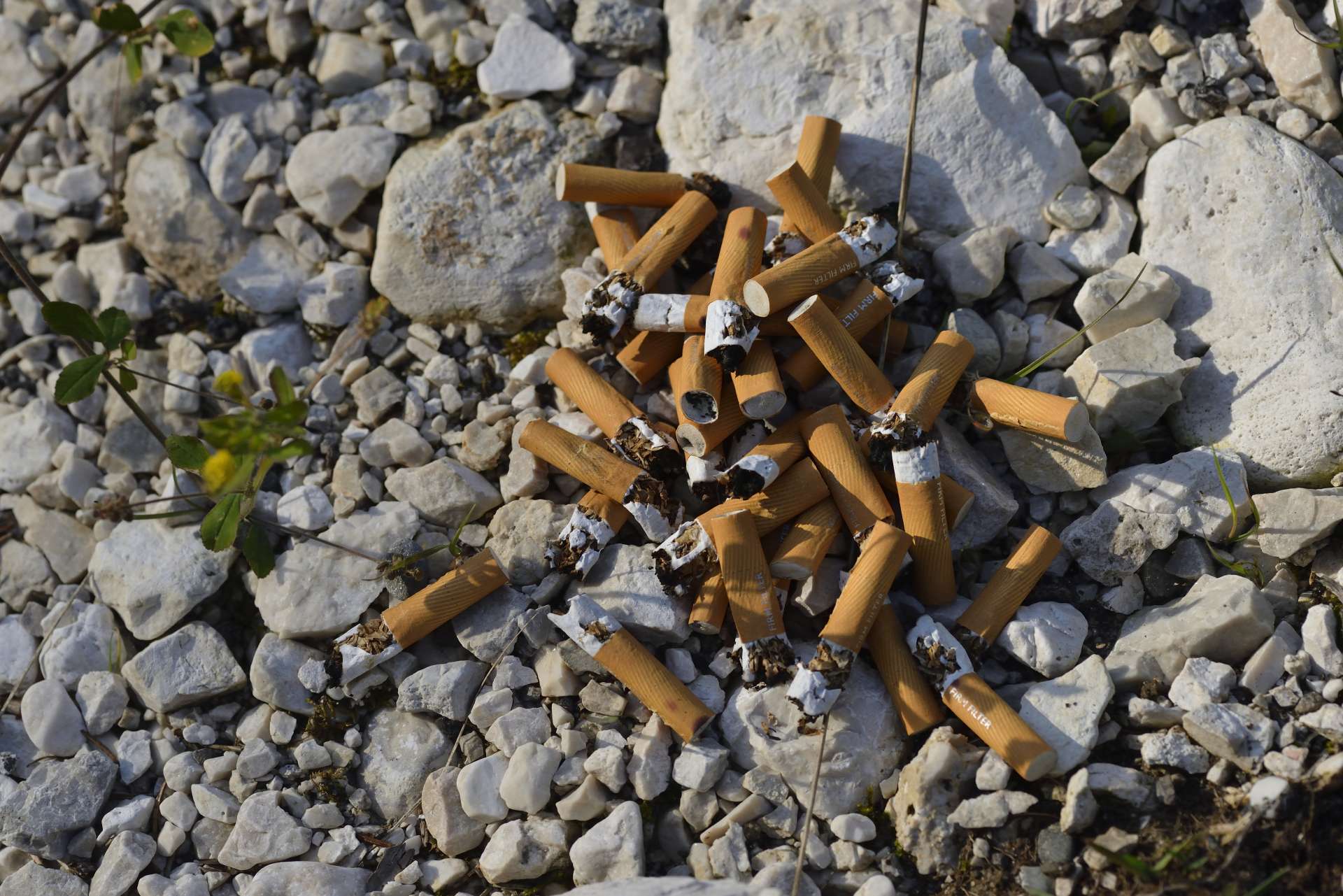
The same scene everywhere. In cities, on the beach, in forests, or in front of the office building: People who smoke and, after the controversial enjoyment of the smoldering cigarette, seemingly carelessly flick the remaining stubs around. An absolute no-go! Many people have probably already thought about the long-term effects of tobacco consumption on the smoker’s health. The possible effects of passive smoking on children and pregnant women in particular are also well known and explain, for instance, the ban on smoking in public buildings. But has anyone ever thought about how smoking can harm the environment?
Here are five reasons to quit smoking for the sake of the environment:
1. Cigarette stubs are a major waste problem
According to the World Health Organization (WHO), around 5.6 trillion cigarettes are smoked in the world every year. (1) Two thirds of this enormous number is discarded on the ground. This behavior results in up to 680,000 tons of toxic hazardous waste
2. Contamination of groundwater
Cigarette stubs do not only look ugly, they also stink. The stench is due to the many toxic ingredients of a cigarette. Cigarettes contain arsenic, lead, chromium, copper, cadmium, formaldehyde, benzene, polycyclic aromatic carbons and of course nicotine. It has long been known that nicotine is a nerve agent. This poison is rinsed out of the stubs of a cigarette lying on the ground and thus ends up in rivers, lakes and in our groundwater. The animals living in these waters can be harmed and even killed by the intake of nicotine. Fish that come into contact with polluted water can also transfer the toxins to us through the food chain. (2) According to an American study, improperly disposed of cigarettes are the “worst contaminant of our oceans” (3)
3. Even more plastic waste
It is widely unknown that the filters of cigarettes are not made of cotton wool, but in most cases from plastic cellulose acetate and can therefore only be degraded in decades.
4. Deforestation for the cultivation of tobacco
According to WHO estimates, at least 6500 hectares of forest are annually felled for the cultivation of tobacco. The tobacco plant is very sensitive and is mainly cultivated in emerging and developing countries. In addition, the plant is very demanding, needs pesticides and leaves the soil permanently leached. (4)
5. Wildfires caused by smoldering cigarettes
Especially in very dry regions and seasons, cigarettes should not be carelessly discarded e.g. from a moving car into a ditch. During prolonged droughts, dry grasses or bushes can quickly become a prey for the hungry flames. There is danger to life for humans and animals!
What can we do?
Sweden is leading the way by banning smoking in public places, even in the open air. In European countries such as France, Spain and Italy, smoking on beaches is increasingly prohibited. The party stronghold Lloret de Mar has been smoke-free since 2019. Non-compliance can result in severe fines, which vary by country. (5)
Even in remote places, where there is no ashtray far and wide, one should not simply dispose of the cigarette stubs by flicking them away for the aforementioned reasons. When travelling, it is advisable to buy a pocket ashtray or another container that can be used for this purpose. If you roll cigarettes yourself, you should make sure to choose unbleached cigarette filters made of cellulose when buying filters.
It does not matter what motivates a smoker to quit smoking, the beginning is hard. Nicotine substitutes, such as nicotine patches or chewing gums, can help you become a non-smoker. Nicotine patches developed and produced by LTS are also part of smoking cessation therapies and can help people start a smoke-free life.
Sources:
1) https://apps.who.int/iris/bitstream/handle/10665/255574/9789241512497-eng.pdf;jsessionid=8480D1837D7F485C12DBF66E43084587?sequence=1 2) https://www.ncbi.nlm.nih.gov/pmc/articles/PMC3088407/ 3) https://www.nbcnews.com/news/us-news/plastic-straw-ban-cigarette-butts-are-single-greatest-source-ocean-n903661 4) https://www.who.int/fctc/publications/WHO-FCTC-Enviroment-Cigarette-smoking.pdf 5) https://www.reisereporter.de/artikel/5467-spanien-straende-verbieten-rauchen-rauchverbot-in-lloret-de-mar-gran-canaria-teneriffa
Bildquelle: Karin Jähne-#313419337-AdobeStock





